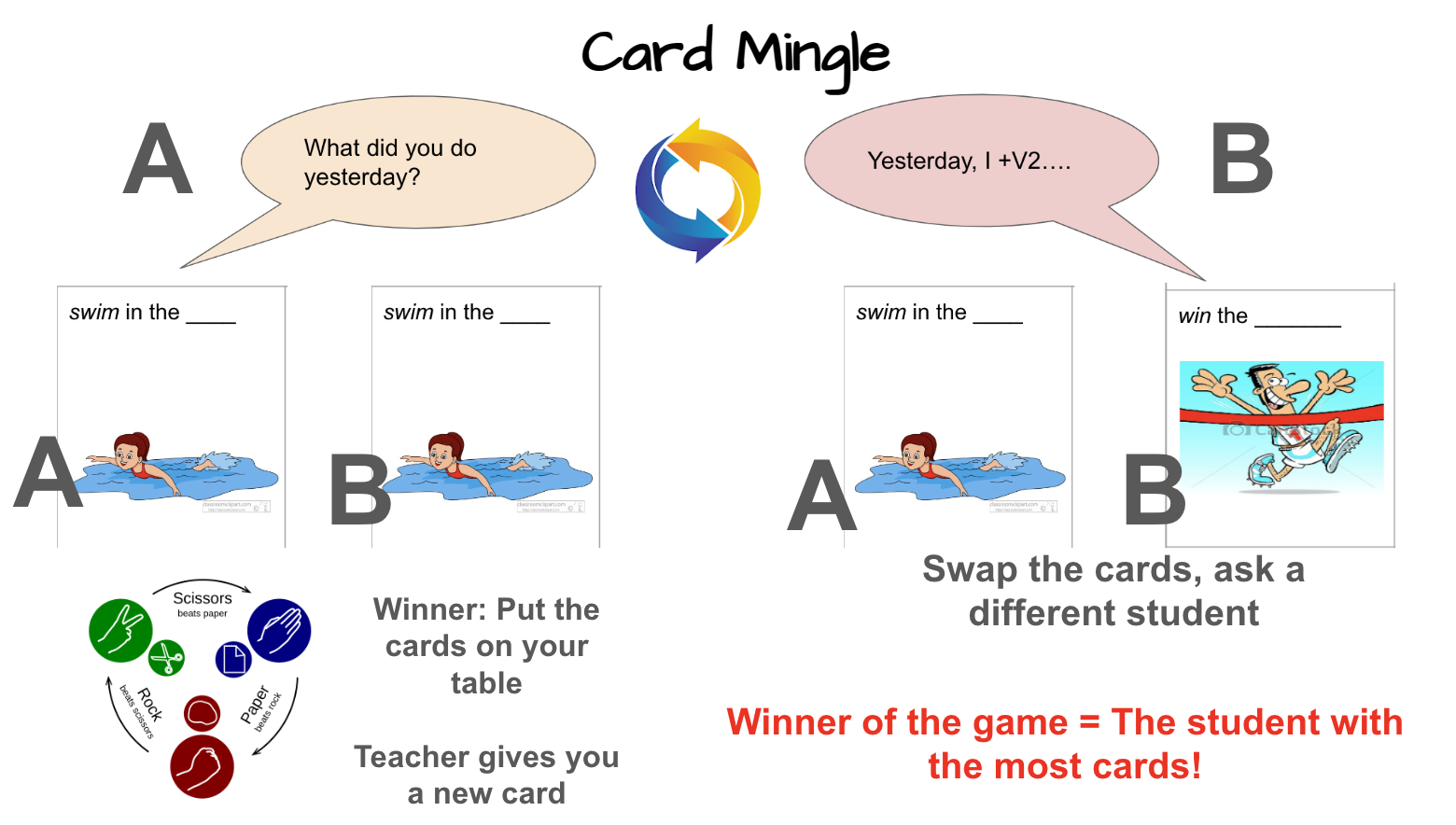By Eva Dianová, Teacher in Bien Hoa, Vietnam
Don’t you agree that there is never enough inspiration for engaging and simple activities to keep your students entertained? In this article, I’m about to share my favourite low-prep activities that can help you get out of your routine or explore more options for delivering an expert English lesson!
Keep them movin’!
Moving around the classroom boosts students’ verbal memory and facilitates the thinking and learning process. Think about it, they are kids and sitting on their chairs for a long time is extremely tiring, not to mention boring. Moreover, with proper monitoring, you can support struggling students better, as they are easier to spot. Even though these games might take more time to explain at first, practice makes perfect and soon, there will be almost no need to give instructions.
Another Speaking Mingle
Easy yet motivating game for competitive students. Students take turns asking and answering pre-made questions, targeting, in my case, the past simple. When they run into a student with the same card, they have a chance to win both cards in a rock-paper-scissors game. If not, they must speak to another student and find a classmate with an identical card.

Scavenger Hunt
No matter, if you are drilling vocabulary or grammar, a scavenger hunt is a fun way to help your students memorise the target language easier. Search for pre-made templates first to cut down your prep time!
Prepare the questions and hide them around the classroom or outside. Allocate groups using a random wheel name picker and give each group an answer sheet. Explain that they must get the answers to as many questions as possible. With proper monitoring, let them run around and get information to write on their answer sheet. Finally, check the answers and announce the winner with the most points.
“Speed Date” Writing
Surprisingly suitable for all levels, speed date writing some requires scaffolding from your or students’ side if you believe in them enough, as you need to prepare questions beforehand. With enough support, students understand what is expected, making writing time way more productive.
It works very similarly to the speaking speed date, but the objective is to produce a coherent writing piece (such as a short story or description) by answering your open questions. After writing one sentence or paragraph, students swap seats and continue answering the following question to complete another article with a new partner. To make it more entertaining, you can tell them to hide the previous sentences so the students don’t know the story’s context they are supposed to continue.
You are left with 5 extra minute
Despite our best time management, lessons are unpredictable, and sometimes you have just a few minutes left. If you don’t feel like starting a new grammar point, why don’t you review the content of the previous lessons in a fun way?
Change chairs if …
Are you tired of musical chairs? Place the chairs in the circle and sit on the speakers’ chair. Start saying, “Change chairs if…” If that condition is true for a student, they must stand up and find a new chair as fast as possible while the speaker also tries to sit down. Lower your TTT and let the students be the speakers.
Never have I ever …
Also known as a variation of 2 truths and 1 lie or a pub game. It’s a great way to get to know your students better. I find it helpful in practising and automatizing the uses of the present perfect tense, which is often tricky for non-native speakers.
Each person holds up a hand and takes turns sharing a statement about something they have never done while saying: “Never have I ever…” If anyone has done the action, they put down their finger. The last standing player wins…or the other way around?
Word chains
Super simple activity; you only need a whiteboard and some markers. Write any longer word (I’m using the months of the year) on the board and let the students think of words starting with each letter. How many can they come up with?
M mouse, mum, …
A aunt, …
R rice, …
C …
H …

Get your devices ready!
A magical phrase that most students are praying for and many teachers are terrified of saying. I know it can be tricky, and the last thing you want is your teens scrolling Instagram or messaging their friends. But put yourself in young kids’ shoes and imagine how exciting it must be to be allowed to play games on their phone in an English class (and study, actually, but they don’t have to know that). I believe you all know Baamboozle, Kahoot, Blooket or Quizlet, but have you tried …?
Mentimeter or Aha Slides
These are wonderful and extremely helpful tools for eliciting target language or brainstorming with word clouds and pools. Using pre-made quizzes can save you tons of time. Another thing I love about these platforms is allowing your students to ask anonymous questions without the fuss.
Jeopardy
Isn’t this game show like a return ticket to your childhood? Have you considered using Jeopardy to prepare your students for their upcoming test and review the language? I played it with my students many times. They bet their classroom money and loved it so much! Check out JeapardyLab for more inspiration.

If you are looking for more ideas on engaging ESL activities, the excellent book Teaching Unplugged is much recommended! It helps you reflect on your teaching practice and gives practical ideas. Lastly, if you are new to teaching, collecting thousands of activities may feel overwhelming. Don’t forget to keep it simple, try what works best for you, and observe your colleagues for more inspiration.
Would you like to teach English in Vietnam? Explore our program page or submit an application




